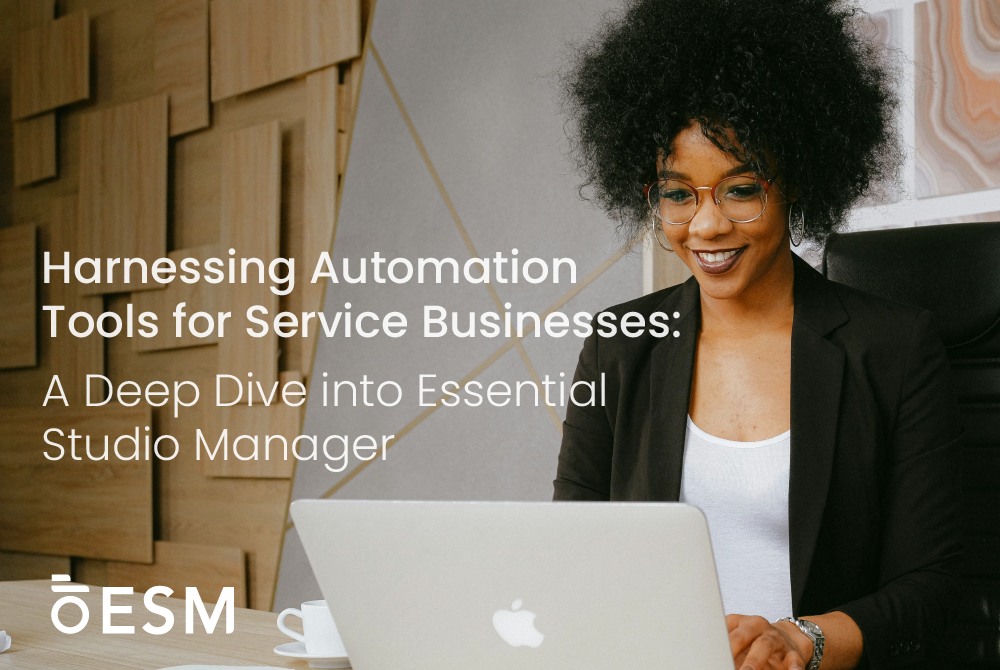“Explore how automation tools for service businesses like Essential Studio Manager can streamline operations and boost efficiency.”
In today’s rapidly evolving business landscape, service-oriented businesses constantly seek efficient ways to streamline operations and enhance customer satisfaction. Automation tools emerge as vital assets in this quest, offering innovative solutions to optimize workflows, reduce errors, and boost productivity. This blog post explores the pivotal role of automation tools in service industries and introduces Essential Studio Manager as a game-changer in managing service-based businesses effectively.
What are Automation Tools for Service Businesses?

Automation tools for service businesses refer to software and applications designed to automate specific tasks within a company’s operational processes. These tools cover various functions, from scheduling and communication to billing and customer management. By implementing these technologies, businesses can free up valuable resources, allowing staff to focus on more strategic activities rather than mundane, repetitive tasks.
Key Benefits of Automation in Service Businesses
- Increased Efficiency: Automation significantly reduces the time spent on administrative tasks like scheduling, invoicing, and follow-ups.
- Improved Accuracy: Automated systems minimize human errors in bookkeeping, appointment setting, and other critical operations.
- Enhanced Customer Experience: With automation, businesses can offer faster responses and more personalized service, increasing customer satisfaction and loyalty.
- Scalability: Automation tools scale with your business, supporting growth without the need for proportional increases in overhead or personnel.
The Importance of Automation Tools in Service Businesses

The importance of automation tools in the service sector cannot be overstated. They provide a competitive edge by enhancing operational efficiency and customer interaction. In the era of digital transformation, customers expect quick, reliable, and personalized services. Automation tools meet these expectations by delivering services efficiently and consistently, ensuring that businesses can attract and retain clients in a competitive market.
Moreover, these tools facilitate better resource management, helping businesses optimize their workforce and reduce overhead costs. This shift not only improves profitability but also enables businesses to reinvest in other areas, such as customer relationship management or new service development.
Examples of Automation Tools for Service Businesses
To provide a clearer understanding of how automation tools can transform service-oriented businesses, here’s a look at some specific examples of tools across various categories:
1. Customer Relationship Management (CRM) Systems
- Salesforce: A powerhouse in the CRM industry, Salesforce offers solutions that automate sales tracking, customer communications, and analytics, all tailored to enhance relationships with customers.
- HubSpot: Known for its user-friendly interface, HubSpot helps businesses automate and manage marketing, sales, and service activities, ensuring seamless customer journeys and interaction tracking.
2. Project Management Tools
- Asana: This tool helps teams organize and track the progress of their projects and tasks. Automation in Asana includes task assignments based on project timelines and the automation of recurring tasks.
- Trello: Trello uses cards and boards to visualize project tasks and timelines, with automation features such as rule-based triggers and calendar commands to keep projects flowing without manual intervention.
3. Financial Management Software
- QuickBooks: An essential tool for financial management, QuickBooks automates aspects like invoicing, payroll, and reporting, ensuring accuracy and saving time for financial officers and business owners.
- FreshBooks: This software is geared towards small to medium-sized businesses, offering capabilities to automate invoicing, expense tracking, and time tracking, helping businesses manage their finances with greater ease.
4. Email Marketing Automation
- Mailchimp: Renowned for its email marketing capabilities, Mailchimp automates email campaigns based on customer behavior, demographics, and engagement patterns, which helps in delivering targeted content without manual efforts.
- Constant Contact: This tool provides automation for email marketing campaigns, allowing businesses to send personalized, scheduled emails to different segments of their audience, improving engagement and retention.
5. Appointment Scheduling Software
- Calendly: Calendly automates the process of scheduling meetings without the need for back-and-forth emails. It integrates with personal calendars and offers controlled availability to ensure appointments are set at convenient times.
- Acuity Scheduling: This tool supports businesses in automating scheduling by allowing clients to view real-time availability and book their own appointments, which can be synchronized with other calendars automatically.
6. Social Media Management Tools
- Hootsuite: Hootsuite enables businesses to automate the posting and management of content across multiple social media platforms. It also offers analytics to track engagement and refine social media strategies.
- Buffer: Known for its simplicity, Buffer allows for the scheduling and automated posting of content across various social media accounts, along with providing insights into post-performance.
Each of these tools is designed to address specific aspects of service business operations, from customer management to financial tasks, thereby enabling businesses to operate more efficiently and focus on delivering high-quality services to their clients. Incorporating these automation tools can significantly reduce the workload on staff, streamline communications, and ensure a consistent and high-quality customer experience.
By leveraging such diverse tools, service businesses not only enhance their operational efficiency but also foster better customer relationships and improve overall business growth.
Spotlight on Essential Studio Manager

Essential Studio Manager stands out as a comprehensive tool tailored for service businesses, particularly those in creative fields like photography, art, and design studios. It integrates seamlessly into daily operations, providing an array of features designed to manage projects, clients, schedules, and finances all in one platform.
Key Features of Essential Studio Manager
- Client Management: Keeps track of client information, preferences, and history, making it easy to maintain personalized relationships.
- Project Tracking: Manages project timelines, deliverables, and deadlines, ensuring projects stay on track and within budget.
- Financial Tools: Automates invoicing and payment tracking, simplifying financial management and improving cash flow.
- Scheduling: Coordinates bookings and appointments with ease, reducing conflicts and enhancing client satisfaction.
How Essential Studio Manager Elevates Service Businesses
Essential Studio Manager specifically addresses the nuanced needs of creative service providers. By automating routine tasks, it allows creatives to devote more time to their art, ensuring that projects not only meet client expectations but also reflect the creativity and quality of the provider. This focus on core competencies can dramatically enhance the value delivered to clients, thereby bolstering the business’s reputation and client base.
Conclusion
In conclusion, automation tools like Essential Studio Manager play a crucial role in the success of service businesses today. Firstly, they enhance operational efficiency. Additionally, they improve customer interactions and enable businesses to focus on their core competencies. Consequently, investing in such technologies is no longer an option but a necessity for businesses aiming to thrive in a competitive, digital-first world.
FAQs
Q1: How do automation tools improve customer service?
A1: Automation tools streamline customer interactions by ensuring quick, accurate, and consistent responses to inquiries and service requests. This reliability enhances the overall customer experience, leading to higher satisfaction and loyalty.
Q2: Can small businesses afford automation tools like Essential Studio Manager?
A2: Yes, many automation tools, including Essential Studio Manager, offer scalable solutions suitable for businesses of all sizes. These tools typically have different pricing tiers based on the features and support required, making them accessible to smaller enterprises.
Q3: What should businesses consider when choosing an automation tool?
A3: Businesses should assess their specific needs, the tool’s compatibility with existing systems, ease of use, scalability, and the provider’s customer support.
Q4: Are there any risks associated with using automation tools?
A4: The primary risks involve data security and system integration. Choosing reputable providers that comply with standard data protection regulations and ensure compatibility with existing systems can mitigate these risks.
Q5: How does automation impact workforce management?
A5: Automation tools optimize workforce management by allocating routine tasks to software, allowing staff to focus on more complex and rewarding activities. This shift can lead to higher job satisfaction and efficiency.




